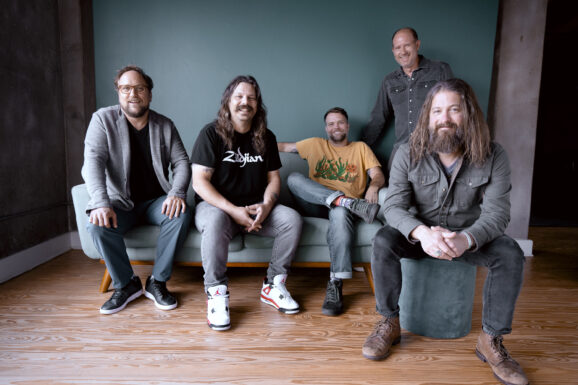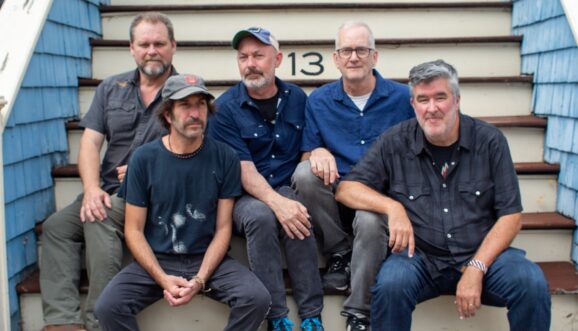Accorded increasingly greater recognition by design over thirty-five years, The Replacements’ Don’t Tell A Soul is no longer their most overlooked album. This concerted effort thus renders the cover photo a decoy of intent: a blurry black and white photo of guitarist and chief songwriter Paul Westerberg depicts him with a finger to his lips as if acting out the tacitly ambivalent initial sentiment(s) of the title to this sixth studio effort by the Minnesota iconoclasts.
The first Replacements album featuring Bob “Slim” Dunlap, who replaced founding guitarist Bob Stinson in early 1987, the record’s plush sound begs the question of whether such spacious sonics suit the band so affectionately dubbed ‘the ‘Mats’ (as in doormats)?
In keeping with the personal and creative second-guessing that had increasingly marked his original material since the group’s 1985 major label debut Tim, Paul Westerberg was not satisfied with the audio as produced by Matt Wallace (Faith No More), then mixed by Chris Lord-Alge (Tina Turner, Green Day). And he has a point: the resonant depth of the audio, combined with the polished sonic sheen, is at odds with the attempts at candid self-awareness in songs like the ever-so-vulnerable “Achin’ To Be.”
The almost equal prominence of acoustic and electric guitars in “Back To Back” is more than just a metaphor for Westerberg and the company’s second-guessing of themselves. But that’s an emotional dichotomy that goes back to their early days of trying to choose between the hard-core approach similar to Minneapolis peers Husker Du and more straightforward (kitschy) pop-oriented likes of which has long dotted their live sets (the Edison Lighthouse’s “Love Grows (Where My Rosemary Goes)” and “Heartbeat- It’s A Lovebeat” by the Defranco Family).
An object lesson in tension release, “Talent Show” is otherwise a tongue-in-cheek exercise in healthy detachment from thoughts of inadequacy both collective and individual, not to mention a casual disregard for a sense of purpose and direction (or lack thereof). And the aforementioned Dunlap’s style of guitar correlates to that focus; far less idiosyncratic than his predecessor, his solo on “We’ll Inherit The Earth,” for instance, is straightforward and to the point and all the better for it, especially as it echoes Mars’ moving around his kit with much the same emphatic flair as the late Charlie Watts of the Rolling Stones..
It’s not as if Don’t Tell A Soul is all mixed messages though. The sheepish tone of “They’re Blind” is a projection of the highest order–or maybe that’s “I’ll Be You”– while the raucous shred ‘n’ holler of “Anywhere’s Better Than Here” is the very kind of jaundiced and in-your-face attitude that so endeared the Replacements to their earliest hometown (and beyond) loyalists.
As precious as the conceit of “Rock ‘n’ Roll Ghost” might sound to those outside the staunch but unforgiving likes of that community, it might be more palatable than the facile funk chord progression of “Asking Me Lies,” especially in combination with the falsetto background voices; anyone who’s read Bob Mehr’s splendid bio of this band, Trouble Boys: The True Story of the Replacements, the Last Rock ‘n’ Roll Band, might well imagine the vocalists cracking up at the microphone in doing such singing.
“I Won’t” sounds forced in its self-righteous fury too, instrumentally and otherwise. It’s almost as if the quartet had so drastically tempered themselves during the recording sessions, that they momentarily forgot how to play with the unmitigated abandon of, for instance, 1983’s Hootenanny. Of course, that kind of blatant emotionalism would be too much to ask of any musician in the midst of reaching maturity (or fighting it?).
In that light, the atmospheric likes of “Darlin’ One” may or may not be about Paul Westerberg or the Replacements. But with its deep, echoed chording and deliberate, rhythmic pace, it certainly sounds true to life in the context of this LP, much more so than the loud self-contortions of “Wake Up,” one of the bonus cuts from the expanded CD.
Along with the rest of the Replacements’ catalog, Don’t Tell A Soul was remastered and reissued by Rhino Entertainment 2008, with seven such additional tracks as well as liner notes by long-time manager Peter Jesperson. Over a decade later in September 2019, producer Wallace assembled Dead Man’s Pop, a comprehensive box set featuring a remixed and resequenced version of the album’s eleven tracks (said to be closer to the band’s original intentions) plus rarities, demos, and other unreleased tracks. Arriving with the blessing of the band who made the studio and concert recordings in the first place, the four-CD, and single vinyl collection effectively anointed the work as a labor of love.
As a result, three and half-decades after it first came out, Don’t Tell A Soul reaffirms how the band known with no little irony as the Replacements helped pioneer alternative rock, whether or not they ever intended to or even held such desires over the course of their tumultuous career.








